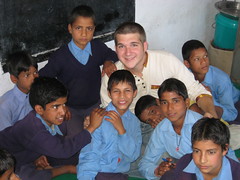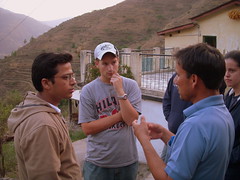 This past week was an incredible cultural experience in which we learned about village life in the Himalayas. We were connected to the villages by a local NGO called SIDH, or the Society for Integrated Development of the Himalayas. This organization helps provide a good education to rural children by giving them a solid base of knowledge and keeping them rooted in their culture. SIDH feels that this way of teaching is important because recent studies show a high percentage of the youth moving away to larger cities, which is breaking up their traditional way of life.
This past week was an incredible cultural experience in which we learned about village life in the Himalayas. We were connected to the villages by a local NGO called SIDH, or the Society for Integrated Development of the Himalayas. This organization helps provide a good education to rural children by giving them a solid base of knowledge and keeping them rooted in their culture. SIDH feels that this way of teaching is important because recent studies show a high percentage of the youth moving away to larger cities, which is breaking up their traditional way of life.
To find out more on this issue, we split into 3 groups and spent a day in 3 different villages talking to people in order to hear their stories and to see how they live. We heard perspectives from 4 areas, the school teachers, the young adults, the small children and the village leaders.
The condition in the villages is centered around a couple problems. The effects of global warming make it difficult for the famers to grow their crops and feed their animals. This is one factor influencing the young peoples’ decision to move in order to find a job. Another reason is that in recent years, people have begun to think they need a disposable income, which would be possible with a job in the city that pays in cash rather than the assets created by subsistence farming. When this happens, however, it tends to break up their traditional joint family systems into nuclear families, which is not as conducive to a successful rural lifestyle. When looking at all these issues combined, it is easy to see how such a cycle is hard to break, but this is something SIDH is working towards.
 While in the villages we also had the chance to play games with the children, and ask the villagers various questions concerning marriages (arranged and love matches), leadership in the village, their daily routines, their religion, and relationships with the surrounding communities. We really enjoyed this opportunity to see the area and connect with people in a more intimate way. We feel privileged to have experienced another aspect of the diverse Indian culture!
While in the villages we also had the chance to play games with the children, and ask the villagers various questions concerning marriages (arranged and love matches), leadership in the village, their daily routines, their religion, and relationships with the surrounding communities. We really enjoyed this opportunity to see the area and connect with people in a more intimate way. We feel privileged to have experienced another aspect of the diverse Indian culture!
-Sylvia Lorisme and Anita Hoover